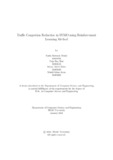| dc.contributor.advisor | Md. Khalilur Rahman | |
| dc.contributor.author | Mouly, Radia Rahman | |
| dc.contributor.author | Rini, Puja Roy | |
| dc.contributor.author | Ethic, Ahsan Habib | |
| dc.contributor.author | Ayon, Mahdi Islam | |
| dc.date.accessioned | 2021-12-13T05:04:00Z | |
| dc.date.available | 2021-12-13T05:04:00Z | |
| dc.date.copyright | 2021 | |
| dc.date.issued | 2021-02 | |
| dc.identifier.other | ID 16101136 | |
| dc.identifier.other | ID 18201213 | |
| dc.identifier.other | ID 16301200 | |
| dc.identifier.other | ID 16301168 | |
| dc.identifier.uri | http://hdl.handle.net/10361/15728 | |
| dc.description | This thesis is submitted in partial fulfillment of the requirements for the degree of Bachelor of Science in Computer Science and Engineering, 2021. | en_US |
| dc.description | Cataloged from PDF version of thesis. | |
| dc.description | Includes bibliographical references (pages 33-35). | |
| dc.description.abstract | The exemplary traffic controlling system is getting helpless because of urbanization and a consistently expanding populace. Living in a cutting-edge time of science and innovation, an advanced arrangement is a beggar description. Reinforcement learning appears to be the advanced promising answer for this endless issue. Thus, proposing a fitting and dynamic methodology to meet the excessive necessity is a significant part of the traffic control system. Our main objective is to using different algorithms in an environment to get the best possible result in order to reducing traffic congestion. Our algorithm ensured the best possible result by comparing different parameters in a SUMO(Simulation of Urban MObility) generated dataset. Firstly, we obtained a result by performing a normal simulation and then performed Q-Learning, Greedy Approach, SARSA, and Bias Q-Learning algorithms. We compared the results from the performed algorithms afterwards. The research is expected to improve productivity in bustling cities by effectively reducing traffic congestion. | en_US |
| dc.description.statementofresponsibility | Radia Rahman Mouly | |
| dc.description.statementofresponsibility | Puja Roy Rini | |
| dc.description.statementofresponsibility | Ahsan Habib Ethic | |
| dc.description.statementofresponsibility | Mahdi Islam Ayon | |
| dc.format.extent | 35 pages | |
| dc.language.iso | en | en_US |
| dc.publisher | Brac University | en_US |
| dc.rights | Brac University theses are protected by copyright. They may be viewed from this source for any purpose, but reproduction or distribution in any format is prohibited without written permission. | |
| dc.subject | Traffic congestion | en_US |
| dc.subject | Reinforcement learning | en_US |
| dc.subject | Q-learning | en_US |
| dc.subject | Greedy approach | en_US |
| dc.subject | SARSA | en_US |
| dc.subject | Bias-Q-learning | en_US |
| dc.subject | MDP | en_US |
| dc.subject | SUMO | en_US |
| dc.subject.lcsh | Reinforcement learning. | |
| dc.title | Traffic congestion reduction in SUMO using reinforcement learning method | en_US |
| dc.type | Thesis | en_US |
| dc.contributor.department | Department of Computer Science and Engineering, Brac University | |
| dc.description.degree | B. Computer Science | |

